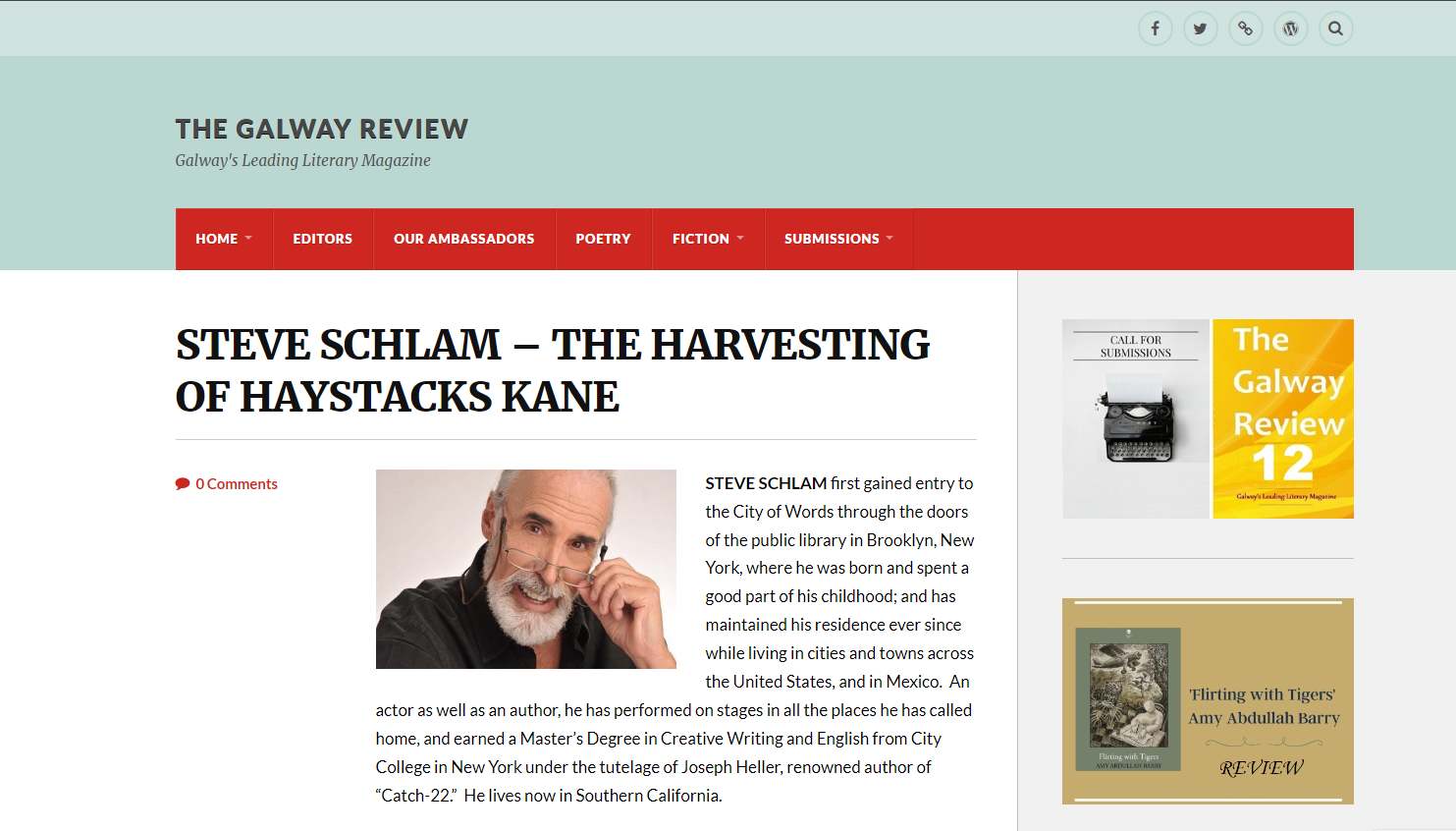What's new at 8th House...

Spillwords features an excerpt of Joao Cerqueira's "PERESTROIKA"
Check out the latest from Spillwords featuring an excerpt of Joao Cerqueira's "PERESTROIKA - An Eye for an Eye, a Tooth for a Tooth" here:
https://spillwords.com/perestroika/
PERESTROIKA: An eye for an eye, a tooth for a tooth by João Cerqueira
398 pages | 5.5 x 8.5 | ISBN 978-1-926716-77-0(pbk.)
About the Book
As the specter of Perestroika sweeps across Europe, communist regimes crumble, and a new era dawns in the People's Republic of Slavia. In the corridors of power, former leaders grapple with the harsh reality of change, while those who suffered under their rule seek justice and revenge.
Amidst the chaos, the central figure emerges – Lia Kirchner, a woman driven by the shadows of her father's tragic fate in a re-education camp. As the daughter of a painter who perished, Lia embarks on a quest for truth that intertwines with the larger tapestry of political intrigue and personal vendettas.
President Alfred Ionescu, once an influential leader, finds himself confined in an asylum of his own making. Zut Zdanov, the head of culture, faces the haunting specter of his dark past in an encounter with allegations of child abuse. Helena Yava, fueled by the grief of losing a lover, seeks vengeance by any means possible. Igor Olin, the steward of the economy, battles for the dignity of his disabled son in a world grappling with change. Meanwhile, art historian Silvia Lenka delves into the mysteries of her own parentage.
Drawing inspiration from Pilate's eternal question – "what is truth?" – "Perestroika" is a kaleidoscope of history, politics, arts, tragedy, and humor. In a world echoing the fall of the Berlin Wall and mirroring the rise of leaders inspired by figures like Putin and Trump, the novel transcends conventional genres, offering a unique blend of entertainment and intellectual depth.
Finalist for the 2021 Eyland Awards, Finalist for Fiction Factory Chapter Novel Competition 2022, finalist in the 2023 Latino Book Awards, and winner of the 2023 HFC European Book of the Year.
João Cerqueiro's latest work "Perestroika" isn't just a novel; it's a resonant exploration of the human condition set against the canvas of recent European history. It challenges readers to ponder the very essence of truth, revenge, and the quest for redemption. Unique in its fusion of historical and literary fiction, it stands as a singular work in a league of its own.
For readers who revel in the rich tapestry of historical and literary fiction, and those with an interest in the intersections of politics and human rights, "Perestroika" is an intellectual and emotional odyssey. At its core, the novel confronts the crises facing today's world – from the European upheavals to Russian aggression, Far Right leaders, and global power shifts.
This is more than a book; it's a call to contemplate the delicate balance between political freedom and humanitarian values. Dive into the pages of "Perestroika" and experience a narrative that transcends borders, ideologies, and genres.

See what they're saying about "PERESTROIKA" on Goodreads
Joao Cerqueira's "PERESTROIKA - An Eye for an Eye, a Tooth for a Tooth" is a favorite with readers with a 4.42 star rating on Goodreads so far.
Read Amanda Taft's 5-star review: “Perestroika" is a historical fiction novel that provides thrilling insights into the late Communist era. The book opens in 1978 and introduces citizens of Slavia like artist Ludwig Kirchner, struggling to survive in concentration camps, whilst the terrifying elites of the regime live in luxury and moral depravity. It all changes in 1989, with Perestroika. In the revolutionary turmoil, former crime boss Ivan Fiorov leads the newly formed 'Freedom Party', heralding a wave of insecurity that resembles the previous dictatorship.
Revenge, redemption and catharsis collide head on with recent European history. With Putin's invasion of Ukraine, alongside a resurgence of populist leaders and neo-Nazi movements across the world, Perestroika is as much a lens into the present as an exciting epitome for the past.”
I read this book on the Pigeonhole app, one stave per day over 11 days, commenting along with other readers. I thoroughly enjoyed this book, my first ever novel on this subject. It’s hard to imagine living through such brutally hard times and even when ‘democracy’ arrived it was really much of the same. I loved the author’s writing style which reminded me of Ken Follett’s with its many characters and interlacing storylines.

A Writer's Journey with Steve Schlam: An Interview
Massiel Valenzuela-Castaneda & Blackhearted Studios interview Steve Schlam on the process of writing, the lyrical power of language, the writer's journey and the artist's plight.
In this insightful episode featuring author Steve Schlam, he shares his journey through writer's block, describing it as both an enemy and a healer. The conversation with Massiel explores the emotional nuances, touching on guilt, anguish, and the gradual process of overcoming creative obstacles. Steve reflects on the existential themes in his novel, "The Harvesting of Haystacks Cain," emphasizing the writer's desire to leave a lasting mark. The discussion delves into the challenges of releasing creative work into a crowded literary landscape and the importance of feedback. Listeners can look forward to the pre-launch period starting in mid-January, leading up to the official book launch in March.
Episode Name: Breaking Chains and Nurturing Creativity: A Writer's Journey with Steve Schlam
Episode Number: 240
Listen to the full episode here.

"Many villains, no hero..." - Casey Walsh on "Perestroika"
"Perestroika, eye for an eye; tooth for a tooth, is a striking work of historical literary fiction, a fable-like political satire.
Cerqueira paints a vivid, if terrifying picture of a brutal regime and the characters who struggle against it are drawn with great pathos. He manages to render even the most odious, self-serving among them as vulnerable, human. The author expertly weaves each narrative into a tense fabric of despair and asks, finally, if there is any redemption in revenge or is true forgiveness the only way to peace, both for individuals and a nation.
A surprise plot twist ties each of the separate, yet intersecting lives of the main characters together in a beautifully poetic way. Readers of political intrigues and Cold War dramas will enjoy this. "
--Casey Walsh – author of the Downs series.
NOW AVAILABLE!! Winner of the 2023 HFC European Book of the Year. Get your copy today!

The Galway Review features an excerpt of "The Harvesting of Haystacks Kane"
Galway's Leading Literary Magazine features an excerpt of Steve Schlam's upcoming novel "The Harvesting of Haystacks Kane" in their latest "Best of the Month" selection.
Read the excerpt here.
ABOUT THE BOOK
Steve Schlam's debut novel, "The Harvesting of Haystacks Kane," is set to captivate readers with its unique storytelling approach and exploration of profound existential themes. Scheduled for release in March 2024 by 8th House Publishing, this literary work follows the story of Herschel Cain, aka Haystacks Kane, a reluctant 607-pound professional wrestler and passionate butterfly collector. Exploited by ruthless promoters, managers, and even his own ex-wife, Haystacks' life takes a dramatic turn when a severe injury in the wrestling ring leaves him on a hospital bed, immobile and unable to speak. Faced with his own mortality, he searches the deeper truths of his existence while he dreams of Greece, Rhodes, and the Petaloudes Valley, where he can live in peace amid the "sound of butterflies."
Schlam's unique narrative technique provides readers an intimate look into Haystacks' psyche as we delve deeper and deeper into the existential aspects of Haystacks' life, his quest for meaning, identity, and liberation. Here the author’s exceptional talent shines through as he skillfully weaves together a tapestry of voices, perspectives, and emotions, promising readers a powerful and unforgettable literary journey into the depths of the human condition.
“The Harvesting of Haystacks Kane”: Wrestling with butterflies and existential meaning: A literary masterpiece that explores the spiritual and philosophical dimensions of the human experience.
About the author: Steve Schlam, born in New York City, has lived across the United States and Mexico. In addition to his writing, he is an accomplished actor and holds a Master's Degree in Creative Writing and English under the tutelage of “Catch-22” author Joseph Heller. "The Harvesting of Haystacks Kane" marks his debut novel, showcasing his prowess in storytelling and profound exploration into the complexities of human existence.

Perestroika: "a tour de force of historical fiction"
JamReads reviews Joao Cerqueira's "PERESTROIKA - An Eye for an Eye, a Tooth for a Tooth" calling it a "tour de force of historical fiction."
Read the full review here.
Order your copy today!
ABOUT THE BOOK
In the turbulent landscape of an alternate Europe lies the captivating tapestry of “Perestroika,” a literary masterpiece that weaves together the threads of revenge, redemption, and catharsis against the backdrop of an imaginary country called Slavia. With a masterful narrative, this novel stands as a testament to the indomitable spirit of humanity in the face of political upheaval.
As the specter of Perestroika sweeps across Europe, communist regimes crumble, and a new era dawns in the People’s Republic of Slavia. In the corridors of power, former leaders grapple with the harsh reality of change, while those who suffered under their rule seek justice and revenge.
Amidst the chaos, the central figure emerges – Lia Kirchner, a woman driven by the shadows of her father’s tragic fate in a re-education camp. As the daughter of a painter who perished, Lia embarks on a quest for truth that intertwines with the larger tapestry of political intrigue and personal vendettas.
President Alfred Ionescu, once an influential leader, finds himself confined in an asylum of his own making. Zut Zdanov, the head of culture, faces the haunting specter of his dark past in an encounter with allegations of child abuse. Helena Yava, fueled by the grief of losing a lover, seeks vengeance by any means possible. Igor Olin, the steward of the economy, battles for the dignity of his disabled son in a world grappling with change. Meanwhile, art historian Silvia Lenka delves into the mysteries of her own parentage.
Drawing inspiration from Pilate’s eternal question—“what is truth?”—Perestroika is a kaleidoscope of history, politics, arts, tragedy, and humor. In a world echoing the fall of the Berlin Wall and mirroring the rise of leaders inspired by figures like Putin and Trump, the novel transcends conventional genres, offering a unique blend of entertainment and intellectual depth.

‘Perestroika’ Percolates With Perspicacity
"PAGES & PAWS" reviews PERESTROIKA: An Eye for an Eye, A Tooth for a Tooth
"Percolates with perspicacity"
- Pages & Paws
Read the full review entitled ‘Perestroika’ Percolates With Perspicacity here.

CBC's Fresh Air with Ismaila Alfa interviews Gandhar Chakravarty
Every Saturday and Sunday from 6 a.m. to 9 a.m., Fresh Air brings you a showcase of voices, stories, events and ideas that make Canada lively and interesting.
Listen to the Ismaila Alfa's interview of K. Gandhar Chakravarty here.

Ryan Oliver of the Mighty Books Podcast interviews Steve Schlam
A trip on a river of words...
to a place of transcendence.
Ryan interviews Steve Schlam where they discuss inspiration, the process of writing, dreams, Catch-22, Ferdinand the Bull and his upcoming novel "The Harvesting of Haystacks Kane".
Listen to the full interview on Spotify.

PERESTROIKA wins 2023 HFC European Book of the Year
8th House Publishing is proud to announce that Joao Cerqueira's upcoming novel "Perestroika: An Eye for an Eye, a Tooth for a Tooth" has won the Historical Fiction Company's 2023 European Book of the Year award.
See the full list of winners.
Here is the full Editorial Review:
"Perestroika" unfolds in an oppressive setting in Slavia, illustrating the diversity of characters ensnared in President Alfred Ionescu's web of authority. The narrative explores the lives of key figures, such as Ludwig Kirchner, the silent dissident artist, and Solidarity leader Adam Jacek, providing a vibrant depiction of a society stifled by censorship and fear.
Kirchner's arrest, whose artistic spirit clashes with President Ionescu's sanctioned official portrait, sets the tone for the suppression of creativity. The regime's manipulation, exemplified by the cunning tactics of Commissioner Zut Zdanhov, adds intriguing layers of politics.
As the plot unfolds, tension rises, starting with the bold escape attempt of Solidarity members Rufus and Zacko. The harsh consequences they face underscore the cruelty of the regime. Questions about survival, loyalty, and the price of resistance add depth to the narrative: "Will those two escape alone, or will others take the chance to join them? What will they do once they’re out? Will anyone be waiting to help them? Will they try to get out of the country or go into hiding? And what if they’re caught? Will they be killed? It’s too risky for you to join the fugitives.”
The author skillfully intertwines personal struggles with the broader political landscape, creating a compelling story of resistance in the face of oppression. "Perestroika" promises an engaging exploration of power dynamics, dissent, and the human spirit in a society grappling with its tumultuous past.
On the one hand, there's Silvia, with a deep education and a commitment as a New Woman, who finds herself in internal conflict between her socialist beliefs and the discovery of an imperfect world. She knows people who have disappeared and has seen men shrouded in the darkness of reeducation. Despite these dark aspects of society, Silvia remains deeply attached to socialist causes and dreams of building a better future for all. However, when faced with the dilemma of reporting someone to the police, Silvia fears for Leonidas, the only person she has ever loved. Despite her devotion to the Party, Silvia begins to question its methods and justice. The tense dialogue with Leonidas reveals Silvia's profound conflict between loyalty to the socialist system and doubt about the Party's authoritarian methods.
The book continues to highlight the conflicts and dilemmas of Ruth Meyer in her clandestine relationship with Helena Yava and her new position as the Director of the Boys' Orphanage in Tiers.
In this forbidden love story, Ruth faces social pressures and ethical dilemmas. Previously married to a military officer to meet family, societal, and Party expectations, Ruth discovers her true happiness in her work as a teacher. However, the clandestine relationship with Helena Yava puts her in a delicate position, and Helena, as the People's Commissar for Education, has her own ambitions and conflicts related to this relationship.
Nominated for the position of Director of the Boys' Orphanage in Tiers through Helena's influence, Ruth discovers the horrors and shortcomings of the institution. The old building, poor living conditions, and inhumane treatment of the children add a tragic dimension to the story. Additionally, the appearance of a Party official wanting to take two boys for a weekend in a villa raises questions about his motivations and the consequences of his actions. In a society where norms are dictated by the Party, Ruth's dilemma in this situation highlights the moral and ethical conflicts faced in the attempt to create the "New Man". As Ruth faces fears and uncertainties, and Helena tries to offer support.
The book continues, further exploring the evolution of the character Albert Remus and the tensions created in the artistic world under Zdanhov's leadership. Albert Remus, a Party member and privileged playwright, faces substantial changes in his artistic creation under the influence of the new directions imposed by Zdanhov. If before the revolution Remus addressed complex topics such as love, betrayal, and revenge, he is now constrained to bring more realistic complexity to his characters, eliminating the exaggerated image of the perfect hero.
Zdanhov suggests to Remus that their literary works must transcend propaganda and endure over time as valuable works. This implies a change in direction for Remus, who must return to his previous approach characterized by doubt, hesitation, and moral ambiguity.
Despite his inner struggles and confrontations with authorities, Remus becomes a symbol of artistic resistance and perseverance in the face of oppression. In this context, the book emphasizes the author's ability to explore character evolution in the context of social and political changes.
Igor Olin is the next character we discover, a complex character who brings notable depth to the story. Initially framed as an artist aware of the desire to rise above the limitations of oppression, Olin is captivating in his process of navigating the complex artistic and political world. Olin experiences significant changes in his attitude toward the Party and the regime as he explores his own artistic voice. He grapples with different emotions, emotions that occur when he looks at his son, Aliocha, who suffers from cerebral palsy. Trying to find a balance between authentic artistic expression and the demands imposed by authorities adds tension and ambiguity to the narrative.
The author highlights the growing tragedy with the death of Ludwig Kirchner and the dramatic events that follow. Kirchner's disappearance, as well as the way it is handled by authorities, adds a layer of intensity and emotional impact. At the same time, the reactions of other artists and dissidents to this loss highlight solidarity and resistance in the face of adversity. Kirchner's death marks a turning point in the story and acts as a catalyst for subsequent events. The intensification of the struggle against the regime, as well as the shocking revelations that emerge, add complexity and nuance to the intrigue.
Events such as the tragedy at the fertilizer factory, the revelation of Ruth Meyer's death, and the confrontation between Jacob Levi and Zut Zdanhov bring a new wave of dramatic twists and surprising revelations. In the context of these events, the story delves deeper into mystery and conspiracy, providing readers with strong reasons to explore the next pages. In this context, the book continues to emphasize the author's skills in masterfully managing multiple narrative threads and maintaining a captivating pace. The complex plot, intertwined with personal dramas and ethical dilemmas, offers a rich and substantive reading experience.
Lia, the daughter of Kirchner and the central character in the novel „Perestroika” brings a unique and captivating dimension to the story. Despite the oppressive atmosphere and dramatic changes in the totalitarian society, Lia maintains a fearless spirit and unwavering determination. As a talented artist, Lia faces pressures and threats from the regime but refuses to compromise her creative vision and integrity. The offer of exile opens up a horizon of freedom for her, but the dilemma between personal salvation and staying in the fight for change adds complexity to her character. Through Lia's evolution, the author explores not only political and social aspects but also the depth of the human spirit in the face of adversities.
It was one o’clock in the morning, and Lia could not sleep. She put her hand on her belly and felt the baby kicking. She smiled. It was not the discomforts of pregnancy that kept her awake. The exile in Paris had turned out more complicated than she supposed. [...] One part would be real, another part she would have to invent, but was not that how History had been written throughout the centuries? What is truth? Pilate had asked Jesus. The truth was what the majority decided it would be at any particular moment. Pilate had found Jesus innocent, but the crowd considered him guilty. That was the truth on which Christianity had been founded. Now it was her turn to play Pilate, and in contrast to him, she had decided that Ionescu’s regime was guilty. [...] To perfect the justice of the Old Testament was the solution. Forgiveness had a price for the executioner: some demanded one of his eyes, others a tooth; I will be satisfied with writing the truth.”
"Perestroika" stands out through the author's ability to create complex characters and explore the subtleties of a changing society. It is a captivating journey into recent history, blending political, social, and personal aspects into a fascinating tableau of the struggle for freedom and truth. The author provides a profound insight into the souls of the characters, and readers are captivated by their evolution in the face of the challenges of oppression.
"Perestroika" not only delights with a well-crafted story but also prompts reflection on the human condition in the face of the pressures of tumultuous history.
********* Winner 2023 HFC European Book of the Year **********

Coming Soon! "Borrowed Memories" by Mark Foss
In a world where identities are in flux, and memories hold the power to shape destinies, "Borrowed Memories" by Mark Foss emerges as a poignant exploration of love, loss, and the search for self. This captivating novel, set to launch in June 2024, promises readers a literary journey that transcends borders and time.
Finalist for the 2020 Guernica Prize for Fiction
"In this tale of identities in flux, an Ontario couple in the depth of their winter years is juxtaposed against the rage and hope of the Arab Spring. Ivan Pyefinch, a freelance translator, becomes the custodian of family memory as he cares for his aging parents in the Thousand Islands. His father, a World War II pilot, fights for his driver’s license, while his mother wages a losing battle against Alzheimer’s. Their lives take an unexpected turn with the arrival of Mia Hakim, an immigrant filmmaker with dreams of her roots and a scenario that binds their stories in ways they never anticipated."
In the midst of the Arab Spring's upheaval, "Borrowed Memories" unravels a tale of shifting identities and the profound impact of memory. Meet Ivan Pyefinch, a freelance translator seeking solace in the Thousand Islands in Canada as he tends to his aging parents, Horace and Aida. Horace, a former World War II pilot, fights to reclaim his driver’s license, while Aida grapples with the relentless advance of Alzheimer’s. Their borrowed time is both a burden and a gift, and Ivan is determined to make the most of it.
Enter Mia Hakim, an immigrant filmmaker from Quebec with a penchant for other people's memories and an unyielding quest for her roots. When she seeks Ivan's help in translating her scenario for a research trip to Tunisia, the collision of their worlds becomes inevitable. As Mia unexpectedly arrives at the Pyefinch home on the eve of Remembrance Day, a family health crisis sets in motion a profound narrative that explores the intricacies of love, loss, and the perennial search for identity.
Praised by the Guernica jury as "an evocative and nuanced story," "Borrowed Memories" immerses readers in Ivan's poignant journey. His ambivalence and longing, caught between the echoes of his parents and the enigmatic Mia, create a captivating internal odyssey.
ABOUT THE BOOK
Ivan Pyefinch, a freelance translator, is the self-appointed custodian of family memory. He moves home to the Thousand Islands for the summer to care for his aging parents and escape the sting of his failed marriage. His father Horace, a former World War II pilot, is fighting now to regain his driver’s license, while his mother Aida wages a losing battle against Alzheimer’s. They are living on borrowed time, and Ivan is there to lend them some more.
Mia Hakim is an immigrant filmmaker in Quebec who has always preferred the memories of others, even as she dreams of her Sephardic roots. She plans a research trip to Tunisia in search of her lost childhood and enlists Ivan to translate her scenario. When Mia arrives unannounced at the Pyefinch home on the eve of the Remembrance Day parade, a health crisis in the family puts all their stories on a collision course.
“... an evocative and nuanced story. Ivan’s ambivalence and longing, caught between his parents and Mia, past and future, make for a fascinating internal journey.”
--Guernica
About the Author:
MARK FOSS is the author of the novels Molly O and Spoilers, as well as the short story collection Kissing the Damned. His fiction and creative non-fiction have also appeared in The Fiddlehead, The New Quarterly, subTerrain, Numéro Cinq, carte blanche, Montréal Serai and elsewhere. A radio drama, "Higher Ground", was broadcast on CBC. He lives in Montreal.
More Articles …
- The Harvesting of Haystacks Kane - Coming Soon!
- Men Reading Books reviews "Perestroika" by Joao Cerqueira
- PERESTROIKA - An Eye for an Eye, a Tooth for a Tooth, wins yet another award!
- Coming Soon!! "PERESTROIKA - An Eye for an Eye, a Tooth for a Tooth" by João Cerqueira
- CBC interviews Gandhar Chakravarty at the TIFA 2023 panel in Toronto
- Broken Pencil Reviews Rolli's "Plumstuff"
- Coming soon: The Harvesting of Haystacks Kane
- 8th House at the 2023 Toronto International Festival of Authors
- "Mr. Grimsby" by Rolli in the latest issue of Cutleaf
- 8th House Publishing Teams Up with Edelweiss to Amplify DRC Access
